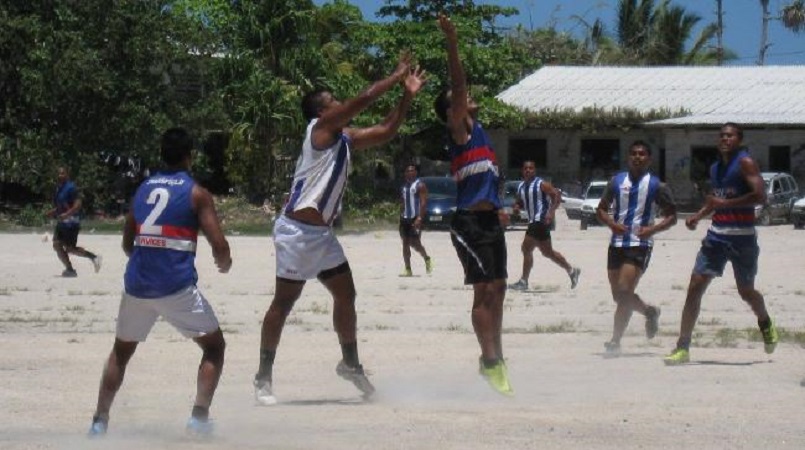
There is only one country in the world where Australian rules football is unquestionably the domin-ant sport — and, strangely enough, it is not Australia.
No, it is the tiny Pacific nation of Nauru — a country intrinsically linked to Australia’s tough border protection regime but less widely known as the most passionate adopter of our indigenous game.
The Australian reports on distant Nauru, all eyes and ears will be focused on the MCG today: their own competition may provide an omen because on September 10 the island’s footy powerhouses, the Bulldogs, won their fifth straight grand final. They beat the Roos in a thrilling contest played out in the heat and dust of Aussie rules, Nauru-style.
Almost a year ago, while on the island to report on the treatment of refugees and asylum-seekers, photographer Kelly Barnes and I were surprised to stumble across training on a scratchy clearing surrounded by palms and shacks.
This was the Panzer Saints juniors and before long I was enjoying a kick with them on the crushed gravel, where some wore boots or sandshoes and others scurried around in bare feet.
The Nauruan kids love their footy and the fondness doesn’t dissipate with age. Like the Saints, each district of this tiny island adopts an AFL team’s jumper and name — the Boe Lions, Ubenited Power, Menaida Tigers — but to minimise tensions the competition has now moved away from district titles. AFL Nauru proudly proclaims on its Facebook page that it “administers the greatest game on earth here in Nauru”.
Football-loving families gather to watch AFL games on the ABC’s Australia Plus satellite service.
The fascination has its origins in Nauru’s seafaring links with Geelong, started a century ago when phosphate mining began and the mineral was regularly shipped to the Corio Bay port.
Many Nauruans travelled to Geelong and dozens were educated there. They exported phosphate to fertilise Australian crops and took back a love for our game that has become deeply rooted in their island home.
Flat land is at a premium on Nauru and most matches are played on Linkbelt Oval — a ramshackle area of crushed phosphate in the shadows of the port.
“One of the district ovals had to be used for new housing,’’ says Nauru Sports Minister Valdon Dowiyogo, who is in Melbourne for the AFL grand final, “but that doesn’t stop the kids, who now just train on the side of the road.”
The island staged its first women’s match this year, as a curtain-raiser to the grand final, but so far none of the island’s almost 1000 refugees and asylum-seekers has taken up the sport. “They are most welcome to join,” says Mr Dowiyogo.
He says although the sport gets no help from the AFL, it has some sponsorship from the Australian Aid Program and its All-Star team competes in the annual International Cup. Training has started for the tournament in Australia in March.
